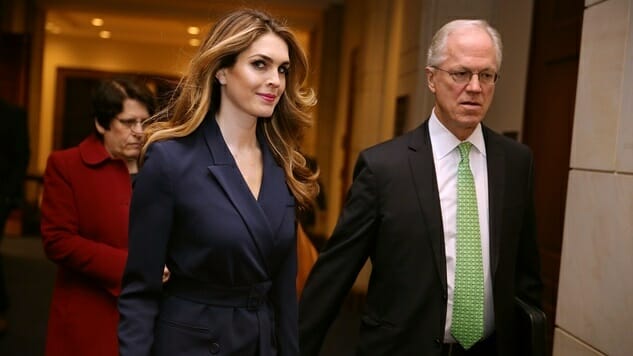Do the Rules Apply to You? A Paste Politics Primer
Photo courtesy of Getty
“Norm!”
– Literally every episode of Cheers, ever.
As part of our duty to the readership, Paste occasionally publishes useful information notices concerning matters before the public eye. This is one such explainer.
Today, Paste asks a crucial question: perhaps the most important question you can ask: do the rules apply to me?
Recent events—involving Bernie Sanders, a money tree and Hope Hicks—suggest that the media elite of this country has stopped pretending to care about rules, in even the flimsiest way.
WHAT HAPPENED RECENTLY TO RAISE THIS QUESTION?
We all remember when Trump and his entire gang of hysterical Islamophobes ganged up on Congresswoman Ilhan Omar. But before the Trump turn, the well-heeled centrists of the Democratic Party had their turn at smearing her. Jacobin, after detailing the President’s nauseating race-baiting, turned to the disturbing comment history of Pelosi’s gang:
This kind of ugliness is par for the course from the Right, which has been encouraging fear of Muslims since the September 11 attacks. But what makes Omar’s case especially frustrating is that this right-wing effort is being buttressed by the liberal center. It was prominent Democrats like Nancy Pelosi and Chelsea Clinton who jumped on the earlier controversies around Omar to give credence to the right-wing narrative that she was a bigot. A number of liberal columnists piled on, sometimes falsely claiming that her comments were about Jews, rather than pro-Israel activists. In a piece of supposedly straight reporting, the New York Times charged that Omar had been “peddling anti-Semitic stereotypes about the undue influence of Jewish lobbies” (a term that Omar never actually used), before noting that these were “common talking points in extremist Islamist circles.” The article has since been altered to make clear these were accusations rather than objective claims, though the line linking her rhetoric to Islamic extremists remains.
“Despite the immediate hand-wringing over Omar supposedly trafficking in ‘tropes,’” Jacobin noted, a number of important Dems seemed completely unruffled by connecting a refugee, Muslim, woman of color to terrorists. This is a profoundly racist association, and they waded right in. “Nor,” the article noted, “did they seem concerned over doubts being raised about her allegiances, even though Muslims and Arabs frequently have their loyalty as Americans questioned.”
Progressives understood the truth: centrists were using smear techniques to slander critics of Israel’s foreign policy. There were a few centrists capable of shame. Not many, but a few. When the anti-Omar libs were called out on the issue, they backtracked. The defenses were palpably godawful: Well, just be more careful about those tropes!
Funny, though: that care stops applying the moment the target moves an inch to the left. Politico literally put Bernie Sanders in front of a money tree:
Politico style book: “needed more context” = the previous tweet contained an anti Semitic trope.
The current tweet contains a doctored photo of Bernie in front of a literal money tree and a house that is not his. Because that is better? https://t.co/T43RCVCokipic.twitter.com/N8LfxgbiID
— Ari Rabin-Havt (@AriRabinHavt) May 25, 2019
Let me reiterate: they put Bernie in front of a money tree, and stacked houses on him. And they called him cheap. And that was just dandy, as far as they were concerned.
Very curious that none of the people who twisted themselves into pretzels to make Meghan McCain a victim of anti semitism have nothing to say about Politico’s “Bernie Sanders is a cheapskate who has a money tree” angle. Very curious indeed.
— Zach Greene (@neatparts) May 25, 2019
HAS THIS BEEN HAPPENING A LOT RECENTLY?
Yes! I chose Bernie because he’s the highest-profile example, and because the anti-Semitism there is particularly flagrant. But rules-shifting isn’t hard to find. Even if Politico had posted a picture of Bernie done by a resurrected Rembrandt, the article still would’ve been a problem, because it was expressly about how cheap he was. And even this escapes the issue. You cannot plead good faith on Bernie (“We didn’t know it was anti-Semitic!”), and shovel bad faith on others (“Omar should have known better!”), and say there are rules. There so clearly aren’t, in this case. The only difference is that Bernie is in Politico’s list of acceptable smear targets. And that’s pretty much it.
The rules-shifting doesn’t stop with Politico. The New York Times ran a story about Hope Hicks, flirting with contempt of Congress, as if she was a high school senior deciding to attend Brown or Dartmouth:
(Dead) Eric Garner “he should have just complied with the law.”
(Dead) Michael Brown “He should have just complied with the law.”
(Dead) Sandra Bland “She should have just complied with the law.”
(White) Hope Hicks “Complying with the law is an existential threat.”
— Rabid Badger (@RabidBadger) May 26, 2019
Maggie Haberman, Trump’s PR person inside the New York Times, wrote the article. But Haberman isn’t alone. This kind of rule-shifting happens across the whole media ecosystem. The writers of these pieces, who imagine themselves as celestial beings above the fray of politics, tend to disavow such gross accusations, like a man caught with twenty-five vape pens at a christening. What’s going on here? What about the rules?
WHAT DO YOU MEAN BY RULES? WHAT’S GOING ON HERE?
As the online meme goes, we live in a society. Do we ever! And this society has rules, as Dads have been fond of saying since the dawn of time.
Now, some of these rules are formal, and written down. These are called laws. Then there are other rules, which are not written down in statute books. They are not passed by any legislature. But they are even more powerful than written laws. These are called norms. Our grandparents called them customs.
Police and judges enforce the laws. But you can’t use cops to enforce custom. Instead, norms are enforced by society. The legal system can throw us in jail, fine us, even execute us. But norms predate law. They are far more pervasive, ubiquitous, and powerful. Norms are the rules that really govern society. Long before the Supreme Court lugged its reactionary carcass over to the side of gay marriage, the bulk of Americans had already decided that they were A-OK with LGBTQ weddings. Some norms are so powerful that entire economic systems are built around them: the wedding industry, the Spring Break bail bond industry. You get the drift.
Guess who provides the first wall of defense for society-wide norms? If you said “the media,” you are correct. The media generally decides what is, and what isn’t, a violation of the norms. You may remember that since Trump became President, the media has been more concerned with norms than ever. Well, sort of.
In these times of uncertainty, we must advise our readers: follow the safest course. Ask yourself—daily, if possible—”Do the rules apply to me?”
WHAT DO YOU MEAN “DO THEY APPLY TO ME?” THEY’RE RULES, THEY ALWAYS APPLY!
A huge section of human debate is based around exactly when and where the rules don’t apply. What do I mean by this?
Say your racist cousin uses a slur. You call him on it. He argues it doesn’t count because he is part Native American. When he does that, he’s subtly arguing that the normal rules don’t apply to him. When a Congressional candidate who was in ROTC during his junior year claims he is actually not a civilian, he’s finding a way that the rules don’t apply to him. When you say that your bachelorette party is already booked and you can’t possibly include Karen—and then Karen turns around and finds out you invited Tonya because Tonya’s just has to be there, I mean, come on, it’s Tonya — you are saying the rules do not apply to Tonya.
And when Donald Trump sundowned out the following words to Billy Bush: “When you’re a star, they let you do it,” why, Donald Trump was making a statement about rules and who they apply to. Trump wasn’t claiming that the rules of sexual assault did not exist. He was claiming the rules banning sexual assault did not apply to TV people, such as himself.
WAIT, SO IT’S LIKE A FREE-FOR-ALL? THE RULES DON’T APPLY THAT MUCH? HAVE I BEEN PAYING PARKING TICKETS LIKE A SCRUB?
Yes to the last question, no to the first two. Oh, the rules definitely apply. America is a carceral state. As TIME Magazine pointed out three years ago, “We found that approximately 39% of the nationwide prison population (576,000 people) is behind bars with little public safety rationale. And they can be released, significantly and safely cutting our prison population.” We love applying the rules here, don’t we folks? See, the rules are like the future. The future has arrived, just not evenly. Rules are the same way.
SO DO THE RULES APPLY TO ME?
An important fact of life to teach the young: the rules have nothing to do with situation. It has to do with who you are, not what with you’ve done. Powerful people tend to not like rules. Powerful people believe that rules are for schmucks. To the mighty, rules are there to keep out the riff-raff, the outsiders. Rules are for little people. The powerful love to apply the rules to you; they don’t like it when the rules are applied to them.
In fact, politics is largely a debate about who the rules do and do not apply to. Leftists and progressives believe the rules should apply to everyone fairly. Libertarians hate the government applying the rules, but simply love private companies applying the rules. Centrists believe the rules don’t apply when you’re at the top of the meritocracy. And conservatives believe the rules apply to everyone who isn’t like them.
So do the rules apply to you? In the final analysis, America is divided along two lines, and they are largely lines about what kind of rules run your life.
If you’re poor or oppressed, the law applies to you. With the results we see every day.
If you’re not, then you fall under the reign of norms. Which is another way of saying, you don’t worry about cops—instead, you worry about not being invited out by people you like. You worry about being shamed on Twitter.
So do the norms apply to you? Hard to say. Realistically, how much money and privilege do you have? I don’t even mean in the conventional way that ordinary, curious, concerned people talk about money and privilege. I mean in a much larger sense: how many people do you know in Manhattan and in D.C.? Who did you go to school with? Are you defending the interests of the powerful? I assure you, if you are a wealthy white centrist in good standing with the power and money of this country, you are invulnerable.
Hope that clears everything right up.







































